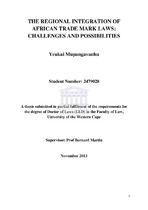The regional integration of African trade mark laws: challenges and possibilities
Abstract
The need to harmonise laws in Africa has grown in importance in view of the envisaged
African common market. Economic integration cannot flourish without an effective regional
legal framework. There is fragmentation in trade mark protection in Africa as evidenced by
the existing two sub-regional organisations namely, the African Regional Intellectual
Property Organisation (ARIPO) and the Organisation Africaine de la Propriété Intellectuelle
(OAPI). The absence of a single regional legal framework has resulted in African countries
not having a coherent strategy for advancing their common interests in regional and
multilateral negotiations. African countries have acceded to agreements which do not reflect
their interests such as Agreement on Trade-Related Aspects of Intellectual Property (TRIPS).
African countries have also been signing Regional Trade Agreements (RTAs) which contain
higher intellectual property protection standards than the minimum standards prescribed by
TRIPS.
The purpose of this study is to formulate a proposal for the integration of trade mark laws in
Africa, with a view to strengthening the regional legal framework. A consolidated regional
position, based on an integrated legal framework, will strengthen Africa’s participation in
negotiations. This will in turn ensure greater regard for, and better protection of, Africa’s
interests and concerns. Trade mark laws are important as they can hinder or promote trade.
Harmonised trade mark laws will create legal and commercial certainty as well as
predictability, which is crucial for the promotion of trade and foreign direct investment. The
central argument advanced is that the areas of convergence in the laws under study and in the
way the laws are interpreted can form the basis for the harmonisation of Africa’s trade mark
laws.

